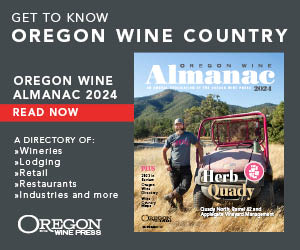Time is right to reconsider a county lodging tax

Yamhill County Commissioner candidate Bubba King has revived discussions about a countywide Transient Lodging Tax (TLT) by making it a key issue of his current campaign.
Incumbent Commissioner Lindsay Berschauer opposes the idea.
Whether for or against it, there is merit in understanding the facts surrounding TLTs as they would pertain to the county, and consider how a lodging tax could benefit the county’s budgeting outlooks.
In 2003, a proposed 8% TLT for Yamhill County was strongly denied by voters by a 3-to-1 margin. About the same time, the Oregon Legislature passed a 1% statewide lodging tax to fund tourism promotion. It has since been increased to 1.5%.
County commissioners in 2008-2009 and 2017 revisited the idea of raising revenue through a local TLT, but neither instance made it past the discussion phase.
Meanwhile, the cities of McMinnville, Newberg and Dundee have enacted their own lodging taxes of 10%, 9% and 10%, respectively. Per state law, 70% of local TLT net revenue must be spent on tourism promotion or tourism facilities, and the other 30% can go to the jurisdiction’s general fund.
As of the most recent counts by Travel Oregon, about 120 jurisdictions have local TLTs, with 16 of them being counties.
Other than the 70/30 spending split, there are few rules imposed on local governments’ TLT programs. According to the state Department of Revenue, there is no limit on TLT rates and counties can enact a varying range of lodging tax rates. A county can impose a tax on lodging facilities only in unincorporated areas; or have one rate for unincorporated areas and another for incorporated lodging; or, even, have a different TLT rate for every city in the county (with the option to share revenues with individual cities).
There are also options for a jurisdiction when it comes to collection of the tax: It can administer collections itself, and decide whether or not to retain an administrative fee; it can have a different jurisdiction collect on its behalf; it can have an organization like a chamber of commerce or visitor organization administer collections; or, as of 2021, the state Department of Revenue has a program to administer tax collection programs for local TLTs.
Now, on to a hypothetical.
A report prepared for Travel Oregon estimates there was $42.3 million spent for lodging accommodations in 2022 in Yamhill County. Of that, about $29.4 million was spent within the three cities with established local TLT programs.
Let’s say Yamhill County had a 1% TLT for incorporated areas that already have a lodging tax and a 10% TLT for cities without their own TLT and all unincorporated areas. Subtract 5% the state requires for collection reimbursement to lodging providers, and factor in the 70/30 spending split, and the county for 2022 would just over $1 million for tourism promotion or tourism-related facilities, and about $530,000 for its general fund.
With plenty of local tourism promotion being achieved from other entities, we again argue the $1 million would best be used on facilities. Whether county roads fit the definition of “tourism-related facilities” has been considered a legal gray area; but Tillamook County does that. The $1 million could without question, however, could be spent on the county fair and fairgrounds facilities. The 70% may also be used to finance debt for such facilities. Commissioner Kit Johnston is trying to rally support for a new fairgrounds complex in the county; TLT revenue could answer the question, “how does the county afford that?”
As for the $500,000-plus to the general fund, it may not seem a significant amount when considering the overall $28.6 million general fund. But keep that amount in mind during the current budget discussions in which the county budget committee is forced to divide up increasingly tight funds. (Also, note the effects of the pandemic on tourism, and know spending will certainly increase from 2022 numbers.)
An extensive process of community outreach and input from all stakeholders would need to take place before we fully endorsed a Yamhill County lodging tax. Given the current budgeting struggles, however, the board of commissioners would be mistaken to not have the conversation. Especially if the reasoning for not having the conversation is based on ideology and not realities.










Comments
manyhands
3 reasons you should NOT vote for Lindsay Berschauer for County Commissioner:
1. Lindsay's campaign includes significant donations from the farming community. Donations from the George family, owners of one of the largest hazelnut processing companies in the country, have been prominent in her previous campaigns. Nothing wrong with that. Where it becomes very, very wrong is when she represents only the big money that helped get her get elected and blatantly ignores the wishes of the citizen majority.
2. Here's one example of how Lindsay serves her wealthy farmer campaign supporters and ignores pure and simple betterment for citizens: In 2020 Lindsay killed the Yamhelas Westsider Trail, even though construction had already begun and it meant returning hefty private donations and a $1.5 million grant to the state. She killed it because her farmer supporters are against having regular people (ugh!) sully "their" lovely county. She killed it even though an online petition in June of 2021 gathered more than 3,200 signatures in favor of the trail.
3. Lindsay appointed six candidates with jaw-dropping conflicts of and lack of qualifications to the county parks advisory board. One of them is her husband. One of them is Celine McCarthy. McCarthy and her husband, Greg, who was convicted in federal court last year of financial fraud, were among the largest campaign finance donors to Lindsay.
4. There are many more examples of this politician's wily undertakings. You'll find them in Mac's News-Register newspaper. Keep informed. Everybody rise up and vote for Bubba King.